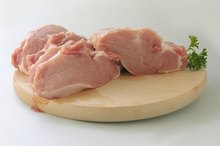What Foods to Eat With a Reduced Gallbladder Ejection
The gallbladder is a small sac located beneath the liver that stores bile, which is made by liver cells. When you eat a meal, muscles in its wall contract to expel bile into your small intestine, where it plays a crucial role in digestion. If your doctor has told you that your gallbladder releases less than 40 percent of its content when it contracts, you have an abnormally low gallbladder ejection fraction. With this condition, avoiding certain foods and paying close attention to your diet can help you avoid painful symptoms and stay healthy.
Meat, Eggs and Dairy Products
Reduced emptying of the gallbladder results in an abnormally low amount of bile available to digest fats in a typical meal. Because of this, choosing low-fat meats and low-fat or nonfat dairy products can help lessen your body's need for bile and reduce symptoms of the condition. Opt for poultry without skin and lean cuts of beef, such as round, sirloin or tenderloin steak, trimmed of all visible fat. Add fish to your diet regularly and avoid using butter or oil in cooking meats, poultry and fish. Choose a hard-cooked, poached or scrambled egg no more than once each day, or opt for low-fat, egg replacement products instead, and use skim milk, low-fat or nonfat yogurt, and reduced-fat cheeses instead of full-fat versions.
- Reduced emptying of the gallbladder results in an abnormally low amount of bile available to digest fats in a typical meal.
- Because of this, choosing low-fat meats and low-fat or nonfat dairy products can help lessen your body's need for bile and reduce symptoms of the condition.
Whole Grains
5 Foods to Avoid If You Have Gallbladder Problems
Learn More
If you have a reduced gallbladder ejection, slowing down digestion by choosing foods rich in fiber can help reduce demand for bile after a meal. Opt for whole-grain foods whenever possible, choosing whole wheat breads and baked goods, and whole-grain pasta and crackers over foods made with white, refined flour. Use whole wheat flour for homemade pancakes and muffins, and add brown rice to meals instead of white rice. Avoid frying rice and potatoes in butter or other fats, and check labels of processed baked goods, avoiding products made with fats or those with added whole-milk cheese or other high-fat ingredients.
- If you have a reduced gallbladder ejection, slowing down digestion by choosing foods rich in fiber can help reduce demand for bile after a meal.
- Avoid frying rice and potatoes in butter or other fats, and check labels of processed baked goods, avoiding products made with fats or those with added whole-milk cheese or other high-fat ingredients.
Vegetables and Fruits
When managing your fat intake to lessen stress on your gallbladder, it's important to eat fruits and vegetables regularly. Most vegetables and fruits are generally rich in fiber and essential vitamins and minerals, and the NYU Langone Medical Center website recommends covering half your plate with these foods at each meal 4. Choose steamed, raw, boiled or baked vegetables, and avoid cooking them in butter or adding sauces that contain butter, cheese or cream. Add fruit to every meal and choose a fruit for a daily snack, eating the peel of apples, pears and plums for added fiber, but avoid avocados and olives, which are high in fat, or reserve these foods for an occasional, special treat.
- When managing your fat intake to lessen stress on your gallbladder, it's important to eat fruits and vegetables regularly.
- Add fruit to every meal and choose a fruit for a daily snack, eating the peel of apples, pears and plums for added fiber, but avoid avocados and olives, which are high in fat, or reserve these foods for an occasional, special treat.
Recommendations
Recommended Diet to Deal with Gallstones and Biliary Colic
Learn More
Polyunsaturated fats, such as those found in plant-based oils, are generally healthy choices, but limit your intake of fats to about 3 teaspoons each day. Most people with gallbladder problems can tolerate a total intake of about 40 to 50 grams of fat daily, according to experts at the Hartford HealthCare Medical Group, but this can vary depending on the severity of the problem 3. Discuss how best to manage your diet with your doctor, to decide on the maximum amount of fat you should consume each day.
Related Articles
References
- Current Treatment Options in Gastroenterology: Biliary Dyskinesia
- Jackson Siegelbaum Gastroenterology: Low Fat Diet
- NYU Langone Medical Center: Fat-Restricted Diet
- University of Maryland Medical Center: Gallbladder Disease
- Shin Y, Choi D, Lee KG, Choi HS, Park Y. Association between dietary intake and postlaparoscopic cholecystectomic symptoms in patients with gallbladder disease. Korean J Intern Med. 2018;33(4):829-836. doi:10.3904/kjim.2016.223
- Arora D, Kaushik R, Kaur R, Sachdev A. Post-cholecystectomy syndrome: A new look at an old problem. J Minim Access Surg. 2018;14(3):202-207. doi:10.4103/jmas.JMAS_92_17
- Malagelada JR, Go VL, Summerskill WH. Different gastric, pancreatic, and biliary responses to solid-liquid or homogenized meals. Dig Dis Sci. 1979;24(2):101-10. doi:10.1007/bf01324736
Writer Bio
Joanne Marie began writing professionally in 1981. Her work has appeared in health, medical and scientific publications such as Endocrinology and Journal of Cell Biology. She has also published in hobbyist offerings such as The Hobstarand The Bagpiper. Marie is a certified master gardener and has a Ph.D. in anatomy from Temple University School of Medicine.









